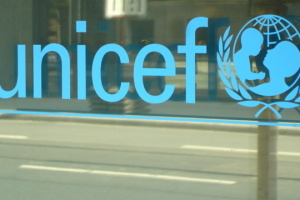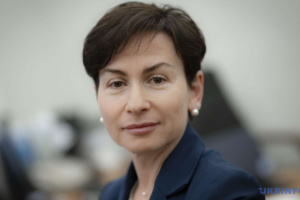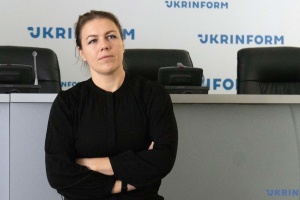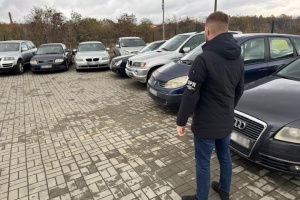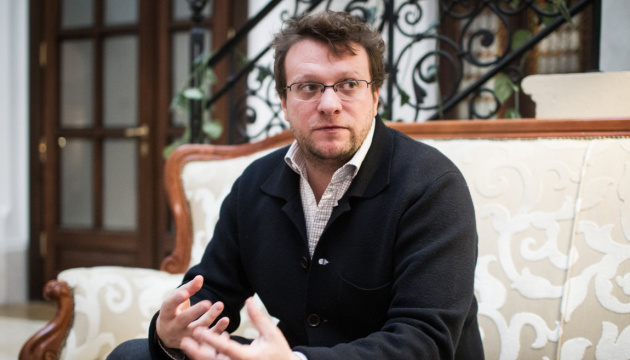
Truth and disinformation: How to make the media a unifying force
In his speech at “Age of Crimea” Forum in Kyiv a renowned media expert, a Visiting Senior Fellow at the Institute of Global Affairs at the London School of Economics, Peter Pomerantsev, elaborates on the current state of the media in the world and the crucial need for them to focus on commonalities instead of fueling hatred. Building on the examples of the Soviet time, he brings the issue of Russian anti-Ukrainian propaganda and offers a way to defeat it.
Ukrinform publishes his whole speech as it was delivered in Kyiv.
***
In August 1976 my father, a Ukrainian, Russian language writer, went for a swim on a beach in Odesa.
When he came back from his swim there were two men in suits standing over his clothes. They flashed their passes at him, they were from the KGB, and told him to get dressed quickly. He had to put his trousers over his wet trunks.
In the drive to the KGB offices and then during the interrogation the trunks were still wet, growing cold and damp around his crotch, leaving a dark patch on his trousers and making him squirm- there he was trying to keep up a dignified façade all he could think about were the wet trunks.
He realized they must have done this on purpose- they were well trained in messing with people’s heads, these mid-ranking KGB colonels of the 1970s. They were also selfish and self-serving: he realized that they had decided to arrest him in Odesa, not in his home town of Kyiv, because they wanted a few days by the seaside themselves.
He had been detained for the possession and distribution of what the regime called 'harmful literature': books written by exiles like Nabokov, or which told the truth about the Soviet labor camps like Solzhenitsyn’s Gulag Archipelago.
The KGB demanded he confess who had given him the censored books, who he had given them to. They threatened that if he didn’t cooperate he would get seven years prison and five years exile.
He refused to cooperate, and so the interrogations continued for many months, first in Odesa and then in Kyiv. After work at the library, the black car would pick him up and take for more questionings. His friends and family were interrogated too, told to confess of his crime of reading books.
At night he would take the short wave radio, and like millions of other Soviet citizens, would try to tune in to Western radio stations through the fog of jamming, hoping to hear about the arrests of his friends across the Soviet Union. He hoped that when and if his arrest would come, his name too would be mentioned on the radio - having your name broadcast to the world gave you a second life.
Everyone prepared for the worst. His mother-in-law taught him a code based on sausages: if I will bring you sausages cut right to left it means we’ve managed to get news of your arrest out to the outside world, and its been handed to human rights groups. If I cut them left to right, it means we’ve failed.
Meanwhile, his life carried on almost as normal. He married. His wife became pregnant. Somewhere in between interrogations, in 1977, in Kyiv, I was born….
After many other adventures, and while I was still a baby, my family ended up exiled from Soviet Ukraine. I grew up in Britain. But the reason I tell this story now is not out of family sentimentality, but because it captures the principles and ideals of what we thought constituted a democratic information space in the 20th century, and which were repressed by 20th-century dictators.
In my father’s struggle for the simple right to read what he wanted and say what he thought we can see a clear example of the battle of freedom of expression against censorship, perhaps the essential battle of the 20th century.
In his attempts to tune into Western radio stations we see the desire for media pluralism as a way of guaranteeing a democratic debate, a yearning for the marketplace of ideas…
And throughout all of this, we can see the idea that the citizens could hold the powerful to account with the truth, that the powerful were afraid of the truth and would go to great lengths to suppress it, and to impose their own version…
This drama, between the ideals of freedom of expression, pluralism and truth on the one hand- and censorship, control over all information and ideology on the other, was dramatized with great power by writers such as George Orwell, who depicted a world where regimes seek to persuade and force people to follow their ideology, convince people that two plus two equals five.
In many places across the world, this fight is still the most important one, not least in occupied Crimea where the Kremlin’s police state censors, takes away people's right to justice and personal security, just like they did in decades and centuries past. The way they’ve always done.
But in many places, in much of the West, but also in South Asia and Latin America, in the Balkans and, I think, in much of Ukraine, the ideals that were meant to guarantee a democratic information space have been turned upside down…
We used to think that the more information there was in society the better it would be for democracy, that the best information would eventually win out in a marketplace of ideas… but today one can create so much disinformation at a click of a button this formula is no longer certain. Will accurate information really win out in a world of troll farms?
And today propagandists and authoritarian regimes don’t necessarily try to convince and persuade people of their ‘truth’, that two plus two equals five. Instead, their aim is to seed doubt, to confuse people, to make them give up on ever finding the truth in a deluge of disinformation, and in this chaos to insist you need a dictator to lead you through a dark, confusing world.
We used to think that the more pluralism there was, the more media, the better the debate. But today, across the world, we see pluralism pushed to the point where it turns into polarisation and factionalism so intense that people live in separate realities, the possibility for interaction between different parts of society breaks down, in ways that can put the cohesion of a country at risk.
And perhaps most disturbingly, we used to think that the powerful were frightened of the truth.
But today we see politicians who don’t care if they are caught out lying, who celebrate the idea that they don’t care about the truth. We see this across the world, not least from the President of Russia who, during the occupation of Crimea, first told the world with his famous smirk that there were no Russian soldiers on the peninsula, when everyone knew there were, and then just as easily celebrated their military success. That wasn’t so much a case of lying as stating that the truth simply doesn’t matter any more…
Indeed today the powerful have also learnt to use the ideals of freedom of expression against citizens. In many countries, they do not crush dissent through censorship or arrest by the secret police, but through creating online mobs and troll farms and cyber militias, who descend like a swarm of online locusts onto critical journalists, attack and intimidate them, accuse them of being ‘fake news’, destroy their reputations and people’s trust in them. But when critical journalists and activists complain about these orchestrated campaigns, argue that they are being used to stifle dissent, the regimes claim that online troll farms are actually just concerned citizens voicing their freedom of expression. ‘Isn’t freedom of expression’, the powerful say, ‘exactly what you journalists and activists fought for in the twentieth century? Well – here you have it!’.
And for all the cynicism of the argument, in a legal sense, they are right. In Article 19 of the Declaration of Human Rights, the article defending the freedom of expression, there is nothing about outlawing ‘disinformation’. There is only the right to receive and impart information. There is no legal category called ‘disinformation’. So opponents of bullying regimes have no philosophical or legal ways to defend themselves….
So we see the great ideals that were meant to guarantee a democratic information space - freedom of expression, pluralism, showing truth to power, the marketplace of ideas - all being used by the powerful to destroy the citizen.
Perhaps one of the strongest examples of this information world turned upside down I saw play out in Odesa, when I visited it to research my latest book some forty years after my father’s arrest there.
As you all know, unlike Soviet times, Odesa is now full of media, with dozens of TV channels, internet portals and social media sites. I visited the city in the aftermath of the terrible fire that killed some forty pro-Kremlin sympathisers in the city. As you all know the Kremlin then waged a vicious information operation in the city, trying to stir up conflict between different ethnicities, spreading an avalanche of lies through its troll farms and paid for propagandists that claimed the fire had been started on purpose, that it was not a tragic accident but the planned mass murder of ethnic Russians …the operation was meant to fuel mistrust, polarisation, and ultimately it aimed to push Odesa into civil conflict and give Putin an excuse to invade.
So in a sense the freedoms that my father fought for when he was arrested in Odesa had been won, there was less censorship in the city than ever before, but a world of more information had not only bought the benefits expected….it meant more ways to spread disinformation, to inflame hatred.
So what do we do to cope in this new world? How can we still uphold the democratic values of freedom of expression, of pluralism and debate, in an environment where all our old assumptions have been turned upside down….
To try to answer that question is the mission of the research centre I direct at the London School of Economics.
We conduct research across Europe to try and understand better how the propagandists work, and what independent media can do to adapt to the new challenges.
We think about what sort of regulation is needed in the new online environment, and we run experiments to see how the media can counter disinformation and polarization….
I believe that regulation does have a role to play in this battle: a small role, but a crucial role.
But for regulation to be effective, and for it to be in line with human rights and laws around freedom of expression, one has to understand more about the specifics of internet information dynamics.
What matters online is not the existence of a single piece of content, but the way it can be pushed and distributed at scale, the ease with which troll farms and bots and search engine amplification can create coordinated, deceptive campaigns.
Take the infamous Russian social media campaign during the 2016 US elections. That often pushed out content that was often neither true nor false, it simply expressed emotions towards various issues. What was “disinforming”, what was deceptive, was the behaviour, the fact one couldn’t tell that what seemed like real Americans online were actually part of a vast, deceptive campaign from St Petersburg.
When it comes to the online world, we need to think of ‘disinformation’ as not so much about content, as about behaviour. I don’t mean individual anonymity, which I don’t have an issue with, but the sort of mass deceptive behaviour a troll farm produces. Regulating this sort of behaviour, making such mass deception illegal, is less likely to contravene freedom of expression rules. Indeed it’s part of a citizen’s right to receive information.
Online we live in a new form of censorship, where we don’t understand how the information environment around us is shaped. This needs to change. We need to know who is behind online campaigns, which content is being targeted at who and why. We need to empower a person to understand who is creating the information around them. Only then can we interact with the information around us as equals, be able to analyse and critique it.
But we need to go ask much more fundamental questions too. Shouldn’t algorithms, the computer programs that define what people see online and in what order, reflect a ‘fair, accurate and balanced’ set of opinions? So if you were to type in ‘Crimea’ in Google, you don’t just get the Kremlin’s propaganda, but a mix of fair and accurate content. And then who will oversee the algorithms, so they abide by such rules?
We need the internet to become a more open space. This sort of transparency will then help us develop a new type of media that instead of driving people apart, works at bringing them together into a common conversation. Media that unifies a nation, connects people to each other.
This means that those who create media getting up every morning and thinking not how they will fire up their own audience against another part of the population, but how to reach those audiences that have become alienated from each other, how to unite polarized groups.
We have to think much more about what is the effect of media on audiences. Does a piece of content encourage evidence-based deliberation or rage? Trust or paranoia? Such things are not difficult to measure, and academics have been researching how to do so for a while.
Back in the late 1990s, for example, the American academic Kathleen Hall Jamieson, showed how the confrontational Presidential television debates, where one candidate attacks the other’s personality, made viewers feel cynical about politics. Today, when I watch TV political debates in many countries, and sometimes in Ukraine, I feel that they are not trying to reach a genuine debate that looks for the truth, but that they are more like reality shows where a lie can be as valued as the truth, as long as it helps fuel conflict.
Can we create TV political debates in a different way? If, for example, we forced candidates to show they would work with each other on solving a policy issue, could that nurture a conversation where facts and cooperation become vital?
In the research we have done we find, for example, that focusing on practical policies to improve the future, rather than on identity politics, can bring out a more rational and civil conversation from audiences.
In our research, we always ask ourselves what are the common values that people in different, seemingly polarised groups hold. I know that in Ukraine much thought has been given to this, as often it has been a question of saving the country from Russia’s aggression. In Odesa, as the information war raged in 2016, I was told how local government officials responded to the Kremlin’s attempts to push the city into conflict. Local Odesan officials felt they knew the people in their city better than Putin. They felt that most Odesans saw their town as a wealthy trading port, a city of markets and merchants. So instead of playing on the ethnic tension, as the Kremlin would have wanted, they decided to target what all sides had in common. They put up posters across Odesa with pictures of the wrecked cities of the neighbouring Donbas, where Moscow’s invasion had led to such destruction. No one in Odesa wanted that sort of future, no one wanted physical destruction. The Kremlin always brings destruction and oppression. Ukraine, on the other hand, means security. And after centuries of being invaded by all sorts of brutal Empires, Ukraine deserves its security, the security that can only come from a strong army and close alliances with those countries that wish it to be free and prosperous.
This year I’ve been back in Odesa again, this time running focus groups that bring together people from different sides of the Odesan political divide. They voted for different people in the last elections. Some are nostalgic for the USSR, others detest it.
But as our focus groups progress, we soon find that beneath these divides, divides that the Kremlin tried so hard to play on with its information war, there are deeper commonalities.
Even those who say they are nostalgic for the Soviet Union, agree that they do not want Soviet censorship and arbitrary arrests in Ukraine’s future. Everyone talks about their experience as children when they realized that the Soviet ideology was a sham, the sense of realization that the pretty words repeated in the Komsomol had nothing to do with the reality of the system. And people on all sides talk, sometimes with great difficulty, about their sense of loss and confusion in the 1990s, how people lost their status and sense of self, but also how they adapted, survived, prospered.
Whenever I travel across Ukraine I’m always struck by one common theme that everyone has in common: the amazing resilience to survive brutal, mental and physical, adversity. The Holodomor of course, but also Nazi occupation, the brutality of the Soviet prison system and secret police, Chernobyl, the war in Afghanistan, the chaos of the 1990s, the Russian invasion...
I think the media of the future needs to explore these difficult experiences, and find the resilience within them. Not to impose a right or wrong, but to allow people to express their experiences, however complex and contradictory they might be.
The lawyer and novelist Larysa Denysenko, who chairs the next panel, has written powerfully about what all Ukrainians share are traumatic experiences: I would add that it is not only trauma, but the resilience to overcome it, to never break under arrest or pressure, whether in Odesa in 1976, or in Crimea in the second decade of the 21st century, or at any moment along the front lines of the war against the Kremlin’s aggression…
“If we could cry out all our pain and speak out all our traumas, grievances and misunderstandings,” says Denysenko, “then our entire land would be covered with blood-stained black soil, fertile and breeding, and on the surface several salty lakes would appear, big ones, the size of a small European country. But we are silent.”
But why quote her - when you can hear from her yourself.

